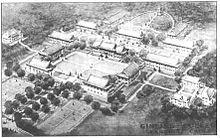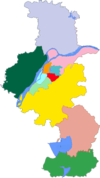|
Nanjing Normal University
Nanjing Normal University (NJNU; Chinese: 南京师范大学; pinyin: Nánjīng Shīfàn Dàxué) is a provincial public university in Nanjing, Jiangsu, China. It is affiliated with the Province of Jiangsu, and co-sponsored by the Ministry of Education and the provincial government. The university is part of the Double First-Class Construction and Project 211.
As of 2020, NNU has three campuses in Nanjing, namely Xianlin, Suiyuan, and Zijin. It consists of 28 colleges and schools with an enrollment of 18,369 undergraduates and 12,564 graduate students, including 1,525 doctoral candidates. History The history of Nanjing Normal University can be traced to 1902 with the establishment of Sanjiang Normal School (三江师范学堂).[3] Sanjiang refers to a historical province in Qing dynasty that roughly covers three provinces in contemporary China, including Jiangsu, Jiangxi, and Anhui. The college evolved into Liangjiang Advanced Normal School, National Nanjing Higher Normal School, National Southeastern University, National 4th Sun Yat-sen University, National Jiangsu University, National Central University, and Nanjing University in the following decades.[4] The other origin of Nanjing Normal University is the University of Nanking which was established in 1888 as Nanking Academy and developed into Private University of Nanking in 1910. It was the first institution in China officially named "university" in English and was registered with the New York State Education Department. In 1951, Private University of Nanking and Private Ginling College, were integrated into the National University of Nanking.[5] In 1952, as the result of the nationwide reorganization of higher education, some schools and departments of Nanjing University and University of Nanking were separated and merged to establish Nanjing Normal College (南京师范学院), which was set up on the former site of Ginling College.[6] The college then exchanged several academic faculties and departments with Soochow University (Suzhou) in Jiangsu Province, establishing a more robust discipline system for both institutions. In 1984, Nanjing Normal College was renamed Nanjing Normal University (南京师范大学).[7] In 1996, it became one of the first group of universities designated by the Ministry of Education of China in the list of former Project 211 for National Key Universities. In 2000, Nanjing Polytechnic of Power Engineering, a national polytechnic institute governed by the Ministry of Chemical Industry at the time, was incorporated into the university. It is included in the Double First-Class Construction.[8] Campus Nanjing Normal University has three campuses throughout the urban and suburban areas of Nanjing, China. Nanjing was named among the best student cities in the world for studying abroad by Quacquarelli Symonds in 2019.[9] It is one of the Four Great Ancient Capitals of China and the current capital of Jiangsu Province.[10] Suiyuan (original campus) Suiyuan Campus (随园校区) (122 Ninghai Rd, Gulou District) is the historical site of the former Ginling College and has been designated as a "Major Historical and Cultural Site Protected at the National Level" of China. It is home to a number of classical Chinese buildings.[11] Xianlin (Main Campus)Xianlin Campus (仙林校区) (1 Wenyuan Rd, Qixia District), located in Xianlin University City, is the main campus of Nanjing Normal University. Established in 2001, it is the newest and largest campus. It occupies an area of 346.7 hectares and is divided into four parts, east, west, north and south, having the majority of undergraduate students study here. The main library in the center of the campus, subsidized by Zhu Jingwen, is the largest single building library in Jiangsu Province.[12] Zijin (Polytechinical Campus)Zijin Campus (紫金校区) (78 Bancang St, Xuanwu District) is the site of the former Nanjing Polytechnic of Power Engineering, which merged into Nanjing Normal University in 2000.[13] It was the home of NNU's School of Electrical and Automation Engineering and School of Energy and Mechanical Engineering, which have been moved to the expanded Xianlin Campus in 2019. AcademicsSince it turned into an independent school from the teachers college of Nanjing University, Nanjing Normal University has become a research university for arts and sciences in China with a number of top-ranked subjects. According to the academic subjects evaluation held by the Ministry of Education in 2012, NNU ranked 3rd in education/pedagogy, 6th in geography, 6th in Marxism studies, 7th in foreign languages and literatures, 9th in psychology, 9th in fine arts, and 13th for law and legal studies.[14] Colleges and schoolsAs of 2020, there are 28 colleges and schools, including:
Majors and programsBy 2020, Nanjing Normal University offers undergraduate degree programs in 74 majors, research master's degree programs in 41 disciplines, professional master's degree programs in 25 disciplines, and doctoral degree programs in 26 disciplines. It has also established 22 post-doctoral research centers. As of 2020, NNU has 29 undergraduate programs that are officially designated by the Ministry of Education of China as "National First-class Undergraduate Programs", including:
Research In recent years, NNU has achieved 32 Key Projects from the National Social Science Fund of China, 7 Philosophy and Social Sciences Key Research Projects from the Ministry of Education, 2 National Science and Technology Support Projects, 4 projects funded by the 973 Program (National Basic Research Program), 1 project funded by the 863 Program (State High-Tech Development Plan), and 28 Key Projects from the National Natural Science Foundation of China. NNU has signed a cooperative agreement with the Nanjing Branch of the Chinese Academy of Sciences (CAS) and the Purple Mountain Observatory, CAS to strengthen cooperation in the frontiers of earth and space science, exchange of faculty and personnel, and joint training of graduate students. On July 4, 2021, the asteroid number 216446, discovered by the Purple Mountain Observatory, was named "NNU Star" with the approval of the Small Bodies Naming Committee of the International Astronomical Union (IAU).[15] RankingsThe 2023 Academic Ranking of World Universities (ARWU) ranked Nanjing Normal University within the range of 401–500 globally.
The 2021 Chinese University Ranking (CUAA) ranked the university 41st comprehensively and 20th for humanities and social sciences, right behind such schools as Shanghai Jiao Tong University (18th) and China University of Political Science and Law (19th) and ahead of such schools as Zhongnan University of Economics and Law (21st), Jinan University (23rd) and Xi'an Jiaotong University (26th).[24] By September 2021, NNU has been listed among the world's top 1% in 10 academic disciplines by ESI, one of the world's most influential indicators of academic capacity. The 10 disciplines include:
Joint programs (selected)
Partner universities (selected)
Student LifeOrganizationsThere are 180 recognized student organizations and clubs on campus. Students can create new organizations to satisfy their own interests and likeminded other students. With the consent from related departments and the approval of the NNU Party Committee, students are also allowed to establish organizations which off-campus students can get involved. Staff members in the Youth League Committee are available. They will connect students with existing recognized student organizations and give advices to start new ones. Registered student organizations (selected)Astronomy Club: a university-level academic club. The astronomy club was founded in September, 2009. Since then, the club has been constantly improving its observation equipments, increasing the number of club members, encouraging participation in various activities, and widening its social influence. The club owns 5 astronomical telescopes, including a reflective astronomical telescope, a refractive and reflective astronomical telescope, and three refractive astronomical telescopes. G-Mix Dancing Club: In October 1999, a group of NNU women founded a school dancing association named G-Mix. The club aims at improving college students' artistic accomplishment. Members dance together at least three times a week. G-Mix also invites professional teachers to give lessons every semester. Guangyu Chinese Opera Club: Guangyu Chinese Opera Club was founded in September 2003. It is a club of various kinds of Chinese operas, such as Beijing Opera, Kun Opera, Yue Opera, Huangmei Opera, Yu Opera. The club holds regular activities every week. Students practice singing on weekdays, train performing on Saturdays, and watch different types of operas on Sundays. There are lectures on Chinese opera every semester as well. The club aims at inheriting and carrying forward the culture of Chinese opera and meanwhile adding varieties to campus activities. HOLA Ballroom Dance Club: HOLA Ballroom Dance Club is a NNU student group focused on social dancing. Founded in 2015 by a group of dance lovers, the club teaches novice and veteran dancers a variety of Latin dances and Ballroom, and takes part in dance events, performances and competitions. The club mainly offers lessons on the International Latin (Cha-Cha, Rumba, Samba, Paso Doble, Jive). Classes are divided into two levels: Beginner and Intermediate, therefore no former experience is required. Team members train weekly to prepare for competitions and performances held in the university and across Nanjing. Athletics Equipped with many complete sets of advanced facilities for exercising, the Xianlin Sports Center covers an area of 23,000 square meters falling in a convenient range for people to reach with six public bus driving directly to the destination and Metro Line 2 a few miles ahead. The Sports Center consists of two gyms, which are designed as the competition venue A with Yoga room, dancing room, VIP fitness center and shower room, and the comprehensive training gym B with warm-watered natatorium, badminton stadium, basketball arena, volleyball arena, table tennis training hall, exercising instrument room for masculine building, room for martial arts training, gymnastic hall, indoor plastic racetrack and two outdoor swimming pools. Many national-leveled and international-leveled sports competitions and artistic performance have been held in the center. In respond to the National Fitness Program, all the exercising rooms are now available to the citizens in Nanjing after the successful holding of the Tenth National Games. Except for the moment of physical teaching and training period, everyone is welcomed to the center to enjoy the shared resources for exercising. Students and others exercise in the Suiyuan sports center after class and on holidays. To meet with the public demand for fitness training and physical recreation, School of Sports Science and Physical Education in NNU has established many training programs open to the public to enhance the social interaction and ease the contradictions caused by the unbalanced distribution of the training zones in the gym. Providing the access to the Sports Center in Suiyuan campus, Nanjing Normal University has acted as an ideal place for public exercising and arena for sports competition. There are three gyms now available to the public: the badminton hall, table tennis arena and basketball arena.[9] Notable alumni
See alsoReferences
External linksWikimedia Commons has media related to Nanjing Normal University.
|
|||||||||||||||||||||||||||||||||||||||||||||||||||||||||||||||||||||||||||||||||||||||||||||||||||||||||||||||||||||||||||||||||||||||||||||||||||||||||||||||||||||||||||||||||||||||||||||||||||||||||||||||||||||

